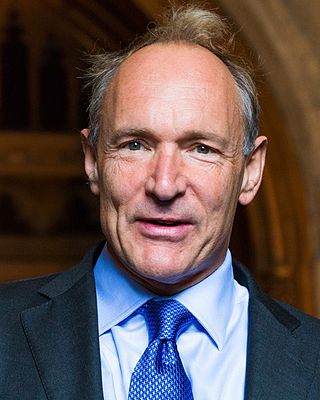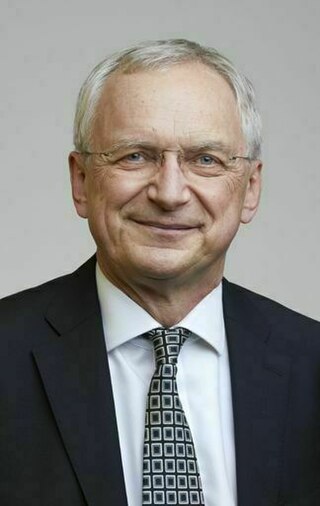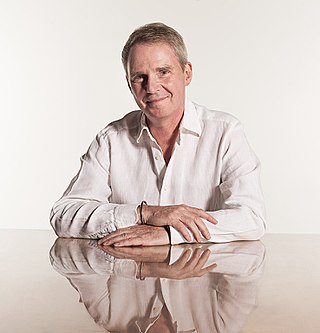Related Research Articles

Sir Timothy John Berners-Lee, also known as TimBL, is an English computer scientist best known as the inventor of the World Wide Web, the HTML markup language, the URL system, and HTTP. He is a professorial research fellow at the University of Oxford and a professor emeritus at the Massachusetts Institute of Technology (MIT).

Sir Andrew Hopper is a British-Polish computer technologist and entrepreneur. He is Chairman of lowRISC CIC, a Commissioner of the Royal Commission for the Exhibition of 1851, former Treasurer and Vice-President of the Royal Society, Professor Emeritus of Computer Technology at the University of Cambridge, an Honorary Fellow of Trinity Hall, Cambridge and Corpus Christi College, Cambridge.

Robert Haldane Smith, Baron Smith of Kelvin, is a British businessman and former Governor of the British Broadcasting Corporation. Smith was knighted in 1999, appointed to the House of Lords as an independent crossbench peer in 2008, and appointed Knight of the Thistle in the 2014 New Year Honours. He was also appointed to the Order of the Companions of Honour in 2016.
David Edwin Potter is the founder and chairman of the microcomputer systems company Psion PLC., and Psion Teklogix after Psion's acquisition of Teklogix in the year 2000.
Ian F. Sommerville, is a British academic. He is the author of a popular student textbook on software engineering, as well as a number of other books and papers. He worked as a professor of software engineering at the University of St Andrews in Scotland until 2014 and is a prominent researcher in the field of systems engineering, system dependability and social informatics, being an early advocate of an interdisciplinary approach to system dependability.
Sir Peter Leahy Bonfield is a business executive who has led a number of companies in the fields of electronics, computers and communications. Currently a director of several companies in the USA, Europe and the Far East, he was formerly chief executive of ICL and more recently of BT Group. He is a Fellow of the Royal Academy of Engineering, the Institution of Engineering and Technology, the British Computer Society, the Chartered Institute of Marketing, the Marketing Society and the Royal Society of Arts. He is a Liveryman of The Worshipful Company of Information Technologists, Freeman of the City of London, Honorary Citizen of Dallas, Texas and Member of the Pilgrims of Great Britain.
Sir John MacQueen Ward is a Scottish businessman.
Martyn Thomas is a British independent consultant and software engineer.

Sir Nigel Richard Shadbolt and Professorial Research Fellow in the Department of Computer Science, University of Oxford. He is chairman of the Open Data Institute which he co-founded with Tim Berners-Lee. He is also a visiting professor in the School of Electronics and Computer Science at the University of Southampton. Shadbolt is an interdisciplinary researcher, policy expert and commentator. His research focuses on understanding how intelligent behaviour is embodied and emerges in humans, machines and, most recently, on the Web, and has made contributions to the fields of psychology, cognitive science, computational neuroscience, artificial intelligence, computer science and the emerging field of web science.
The Birthday Honours 1990 for the Commonwealth realms were announced on 15 June 1990, to celebrate the Queen's Birthday of 1990.

Sir David Roberts McMurtry was an Irish-British billionaire businessman, who was the co-founder and executive chairman of Renishaw plc, the UK's largest supplier of metrology equipment. As of December 2024, his net worth was estimated at US$1.3 billion.

Sir David Warren Arthur East is a British businessman and engineer. He is a former chief executive officer (CEO) of Rolls-Royce Holdings, a leading UK-based engine manufacturer, and previously held senior positions at ARM Holdings and Texas Instruments.
Sir David Evan Naunton Davies is a British electrical engineer and educator, knighted for services to science and technology in the 1994 New Year Honours.
Sir Alistair George James MacFarlane was a Scottish electrical engineer and leading academic who served as Principal and Vice Chancellor of Heriot-Watt University, Edinburgh, and Rector, University of the Highlands and Islands.
Sir Ian David Grant FRAgS was a British corporate director who was chairman and first commissioner of the Crown Estate. He also served as the Chairman of the Scottish Exhibition Centre from 2002 to 2013. Grant was knighted by Elizabeth II in 2010.
Sir John Calman Shaw was a Scottish businessman, chairman of the board of directors and Governor of the Bank of Scotland from 1999–2001, deputy governor from 1991–1999 and a non-executive director from 1990–2001.
The 1993 Queen's Birthday honours were appointments by some of the 16 Commonwealth realms to various orders and honours to recognise and reward good works by citizens of those countries. The Birthday Honours are awarded as part of the Queen's birthday celebrations and were announced on 11 June 1993 for the United Kingdom, the Bahamas, Solomon Islands, Saint Lucia, Grenada, Papua New Guinea, and New Zealand and the Cook Islands. The list for Australia was announced separately on 14 June.

Lena Cooper Wilson CBE is a United Kingdom Scottish executive and bank employee. She rose to be the CEO of Scottish Enterprise. She went on to directorships with a number of organisations.
Sir Donald John Miller was a Scottish electrical engineer and former chairman of the South of Scotland Electricity Board and Scottish Power.
References
- ↑ TED Talk given by Ian Ritchie
- ↑ "The World's first website". Archived from the original on 17 July 2015. Retrieved 2 March 2016.
- ↑ "No. 56797". The London Gazette (1st supplement). 31 December 2002. p. 8.
- ↑ "Mr Ian Cleland Ritchie CBE FREng FRSE - The Royal Society of Edinburgh". The Royal Society of Edinburgh. Retrieved 18 December 2017.
- ↑ "Inductees 2022". Scottish Engineering Hall of Fame. Retrieved 10 December 2022.